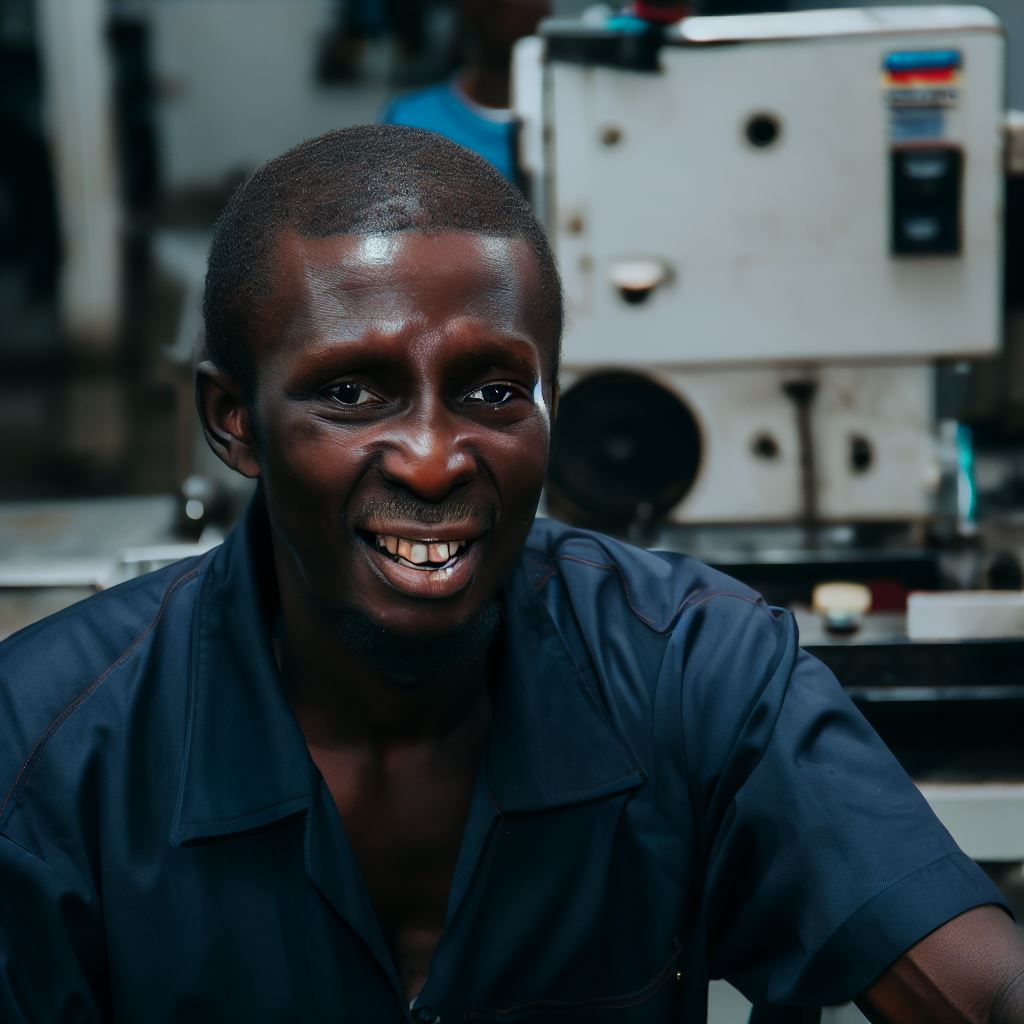Introduction
Optical fabrication technicians in Nigeria face numerous challenges in their line of work.
These challenges are diverse and affect the efficient functioning of the technicians in the optical industry.
In this blog section, we will delve into some of the key challenges faced by these technicians and their impact on the country’s optical industry.
Importance of Optical Fabrication Technicians in Nigeria’s Optical Industry
Optical fabrication technicians play a crucial role in Nigeria’s optical industry.
They are responsible for the production and manufacturing of various optical components, such as lenses, mirrors, and prisms.
These components are vital in the production of optical instruments used in various sectors, including healthcare, research, and telecommunications.
Without skilled optical fabrication technicians, Nigeria’s optical industry would struggle to meet the growing demand for optical products and services.
These technicians are at the forefront of ensuring the quality and precision of optical components, which directly impact the performance of optical instruments.
Furthermore, the work of optical fabrication technicians contributes to the advancement of other industries, such as medicine and telecommunications.
The development of high-quality optical instruments enables healthcare professionals to accurately diagnose and treat various medical conditions.
Additionally, the telecommunications industry relies heavily on optical components for the transmission of data over long distances.
Optical fabrication technicians play a vital role in Nigeria’s optical industry.
The challenges they face can significantly impact the industry’s ability to meet the demand for optical products and services.
As such, it is crucial to address these challenges and provide adequate support and training to the technicians to ensure continued growth and development of the optical industry in Nigeria.
Lack of proper training and education
Optical fabrication technicians in Nigeria face significant challenges rooted in insufficient training and education:
- Limited Training Opportunities: Specialized training programs for optical fabrication technicians are scarce in Nigeria.
- Skill and Knowledge Gap: Inadequate education affects technicians’ competence in complex optical fabrication tasks, leading to errors and lower-quality products.
- Technological Disadvantage: Lack of training hinders awareness of industry advancements, reducing competitiveness with technicians from well-trained countries.
- Stunted Career Growth: The absence of continuous education limits professional development and adaptation to new technologies.
- Infrastructure Deficiency: Inadequate access to modern equipment and tools hampers job efficiency and quality product production.
Addressing these challenges requires government and stakeholder intervention through:
- Investment in specialized training programs
- Promotion of continuous education opportunities
- Provision of necessary infrastructure and equipment
By taking these actions, Nigeria can empower its optical fabrication technicians, enabling them to contribute effectively to the industry’s growth and development.
Read: Exploring Food Science Careers in Nigeria: A Beginner’s Guide
Limited access to modern technology and equipment
Optical fabricators in Nigeria encounter numerous challenges:
- Limited access to modern equipment impedes global competitiveness.
- Financial constraints hinder investments in costly optical fabrication machinery.
- Scarce specialized training programs hinder skill development and equipment utilization.
- Inadequate infrastructure, like unreliable power, affects productivity.
- Insufficient research and development hinder innovation and access to advanced technology.
- Government support, funding, and policies favor other sectors over optical fabrication.
- Supply chain inefficiencies hinder access to reliable and affordable machinery.
- Limited awareness and demand for high-quality optical products restrict market opportunities.
- Outdated technology leads to quality control issues, affecting reputation and competitiveness.
- Inadequate collaboration and knowledge-sharing hamper industry growth and standards adoption.
Addressing these challenges necessitates investments in training, infrastructure, research, government support, and industry collaboration.
Read: Salaries of Food Scientists in Nigeria: A Detailed Insight
Inadequate infrastructure and facilities
Optical fabrication technicians in Nigeria encounter multiple challenges related to inadequate facilities, impacting their efficiency and safety:
- Insufficient laboratory space limits experimentation and equipment accommodation.
- Lack of specialized equipment hinders precise optical component fabrication.
- Inadequate cleanrooms affect component quality by permitting contaminants.
- Poor ventilation systems jeopardize technician health and product quality.
- Shortages of essential materials lead to delays and compromised component quality.
- Limited access to advanced technologies impairs competitiveness on a global scale.
Addressing these challenges requires infrastructure investment, equipment provision, cleanroom establishment, ventilation improvement, and material supply consistency.
Empowering Nigerian optical fabrication technicians benefits the optical industry’s development and competitiveness.
Read: Top Universities for Food Science in Nigeria: A Review
Limited research and development opportunities
Optical fabrication technicians in Nigeria face a daunting challenge due to limited research and development opportunities:
- Insufficient funding restricts access to research tools, equipment, and materials, hindering innovation.
- A shortage of skilled researchers in the field stifles technological advancement and collaboration.
- Inadequate research impedes the exploration of new fabrication techniques, hindering work quality and efficiency.
- Limited innovation affects product and service development, impacting industry competitiveness and job opportunities.
- Challenges in staying updated with industry trends due to limited access to research resources.
- Restricted collaboration and knowledge exchange with international counterparts hinder expertise and technology transfer.
To overcome these hurdles, stakeholders must prioritize optical fabrication research and development.
Increased funding, collaborations with international institutions, and educational programs can foster innovation and growth in the field.
Read: Salary Expectations for Actuaries in Nigeria: A Detailed Look

Economic constraints and low job prospects
Challenges Faced by Optical Fabrication Technicians in Nigeria
Economic constraints and low job prospects
- Optical fabrication technicians in Nigeria often face economic challenges, such as low wages and lack of job security.
- Their salaries are typically insufficient, making it difficult for them to meet their basic needs and support their families.
- The lack of job security further adds to their economic stress, as they are constantly uncertain about their future employment.
- With the rising cost of living in Nigeria, these economic constraints make it extremely challenging for optical fabrication technicians to sustain a decent standard of living.
Explore the economic challenges faced by optical fabrication technicians, such as low wages and lack of job security
One of the main economic challenges faced by optical fabrication technicians is the issue of low wages.
Many technicians in Nigeria are paid minimal salaries that are not commensurate with their skills and expertise.
This low wage structure often demotivates the technicians and affects their overall job satisfaction and performance.
In addition to low wages, another significant economic constraint is the lack of job security.
Optical fabrication technicians in Nigeria typically work on temporary contracts or are hired as casual workers.
This lack of job security creates a sense of instability and uncertainty in their professional lives.
Discuss the impact of these constraints on the motivation and retention of skilled professionals
The economic constraints faced by optical fabrication technicians in Nigeria have a profound impact on their motivation and retention as skilled professionals.
Low wages make it difficult for technicians to stay motivated and dedicated to their work.
When their efforts are not adequately rewarded, they may feel undervalued and demoralized, resulting in decreased productivity and lower-quality output. The lack of job security further exacerbates the situation.
Many skilled professionals seek long-term stability and job prospects to feel secure in their careers.
The constant uncertainty of employment for optical fabrication technicians in Nigeria leads to a high turnover rate and difficulty in retaining skilled individuals in the field.
Furthermore, the economic challenges faced by these technicians discourage young individuals from pursuing careers in optical fabrication.
The low job prospects, coupled with the lack of financial rewards, deter potential talents from entering the profession.
This scarcity of new professionals hampers the growth and development of the optical fabrication industry in Nigeria.
The economic constraints faced by optical fabrication technicians in Nigeria, such as low wages and lack of job security, have a significant impact on both their motivation and the retention of skilled professionals.
These challenges not only affect the technicians’ financial well-being but also hinder the growth of the industry as a whole.
Measures must be taken to address these economic constraints and provide better job prospects to ensure the sustainability and success of the optical fabrication sector in Nigeria.
Conclusion
Optical fabrication technicians in Nigeria face several key challenges.
These include a lack of access to education, limited infrastructure, and outdated technology.
Addressing these challenges is crucial for the growth and development of the optical industry in Nigeria.
Investment in education can provide technicians with the necessary skills and knowledge to meet industry demands.
Improving infrastructure, such as establishing well-equipped laboratories and manufacturing facilities, is essential for efficient and quality optical fabrication.
Upgrading technology will enable technicians to keep up with global standards and advancements in the industry.
Overcoming these challenges will bring significant improvements to the optical industry in Nigeria.
It will enhance job opportunities, increase production capabilities, and attract foreign investment.
Additionally, it will foster innovation and competitiveness in the global market.
Most importantly, investing in education, infrastructure, and technology is crucial for enabling optical fabrication technicians in Nigeria to overcome their challenges and contribute to the growth and success of the optical industry.




